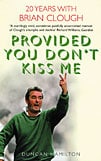 20 Years with Brian Clough
20 Years with Brian Clough
by Duncan Hamilton
Fourth Estate, £14.99
Reviewed by Al Needham
From WSC 244 June 2007
Provided You Don’t Kiss Me starts with Hamilton as a terrified teenager in Brian Clough’s office doing an interview for a local sports paper (naturally, Clough asks more questions than the author) and ends on the sofa of his girlfriend’s Leeds flat on the day that Clough died, tearstruck over a father figure he barely realised he had. The story in between – the memoirs of nearly two decades serving as Clough’s mouthpiece in the Nottingham Evening Post – blows away anything The Damned Utd came up with.
This is a harsh read for any Forest supporter; if it’s not a consummate dismantling of the central tenets of Cloughology, it’s a definite unscrewing of a joint or two. For starters, Hamilton makes a strong case for the restoration of Peter Taylor’s role in the story, to the extent of claiming that Clough was crippled managerially and emotionally by their acrimonious break-up, to which the author was a party (and to some extent, the pawn of). The sketches of Taylor – usually seen as the jokey, flippant one who defused tension before European matches by trying to get block-bookings at the local sex show – provide the most disturbing moments in the book; his bitterness behind the hasty airbrushing-out of his role in history seeps through the pages.
As for Clough himself, Hamilton doesn’t hold back; the Leeds dismissal, far from being a wounding blow, actually gave Clough the financial cushion to do what he liked. Except that he couldn’t have done it anywhere else but at Forest – being the only club in the league controlled by a committee actually gave him the opportunity to run a dictatorship. Oh, and he would have been a disaster as England manager for being frighteningly un-PC, even by late-1970s standards.
The Clough that emerges throws even more contradictions into the mix. We knew about the Champagne Socialism, the kissing of people he’d chinned earlier and the foul-mouthed banner of swearing at the ground. Now we also discover that the biggest quote machine in sport wasn’t that bothered about the media, and was happy to let Hamilton ghost page after page of copy on his behalf. “Let’s you and me write a piece and tell them (the FA) to fuck off – in the nicest possible way,” he says, early into the relationship. “You’ll pick the right words… make it up for me.”
Although you get the feeling that Hamilton has been nudged by his publishers into darker realms, the good stuff – Forest winning pretty much everything in sight with a collection of scrag-ends and clinically astute signings, his myriad random acts of kindness to locals and Cloughisms ahoy (“The only agent back then was 007 – and he shagged women, not football clubs” is my favourite) – is still there to be picked over. Hamilton also does a great service to the hitherto unrewarded Len Shackleton, Harry Storer and Alan Brown by naming them as the biggest influences on Clough’s style. By the end of the book – Hamilton intoning “Brian Clough lived. He lives still” in a weirdly Stalinist way – you find yourself with as near an understanding of the man and his machinations as you’re ever going to get.
I wouldn’t say that this was the best book about Brian Clough ever written – and I’d love to argue the toss with the author on a point or two – but for now, it’s in the top one.